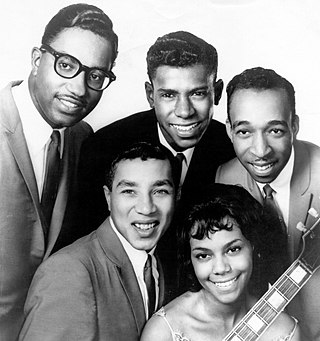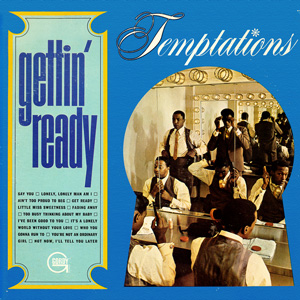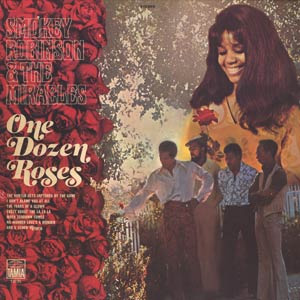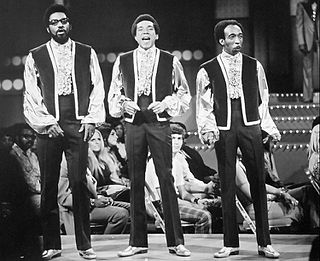
William "Smokey" Robinson Jr. is an American singer, songwriter, record producer, and former record executive director. He was the founder and front man of the Motown vocal group the Miracles, for which he was also chief songwriter and producer. He led the group from its 1955 origins as "the Five Chimes" until 1972, when he announced his retirement from the group to focus on his role as Motown's vice president. However, Robinson returned to the music industry as a solo artist the following year. Robinson left Motown Records in 1990, following the sale of the company two years earlier.

The Miracles were an American vocal group that was the first successful recording act for Berry Gordy's Motown Records, and one of the most important and most influential groups in pop, rock and roll, soul and R&B music history.

The Marvelettes were an American girl group that achieved popularity in the early to mid-1960s. They consisted of schoolmates Gladys Horton, Katherine Anderson, Georgeanna Tillman, Juanita Cowart, and Georgia Dobbins, who was replaced by Wanda Young prior to the group signing their first deal. They were the first successful act of Motown Records after the Miracles and its first significantly successful female group after the release of the 1961 number-one single, "Please Mr. Postman", one of the first number-one singles recorded by an all-female vocal group and the first by a Motown recording act.

Robert Edward Rogers was an American musician and tenor singer, best known as a member of Motown vocal group the Miracles from 1956 until his death. He was inducted, in 2012, as a member of the Miracles to the Rock and Roll Hall of Fame. In addition to singing, he also contributed to writing some of the Miracles' songs. Rogers is the grandfather of R&B singer Brandi Williams from the R&B girl group Blaque and is a cousin of fellow Miracles member Claudette Rogers Robinson.

Gettin' Ready is the fourth studio album by The Temptations for the Gordy (Motown) label released in 1966. It marks the transition of the group from having Smokey Robinson as its main producer, with new producer Norman Whitfield taking over Robinson's position. Two #1 R&B hit singles, one from each producer, are included: "Get Ready" from Robinson with Eddie Kendricks on lead, and "Ain't Too Proud to Beg" from Whitfield with David Ruffin on lead. Also included is the original version of "Too Busy Thinking About My Baby," which would be rerecorded as a hit for Marvin Gaye in 1969. The album was also one of the last albums to contain tracks co-authored by members of the group until the release of The Temptations Do The Temptations (1976). As with previous Temptations albums, several songs are written by members of The Miracles: Smokey Robinson, Bobby Rogers, Pete Moore, Ronnie White, and Marv Tarplin.

"Ooo Baby Baby" is a song written by Smokey Robinson and Pete Moore. It is a classic 1965 hit single by The Miracles for the Tamla (Motown) label. The song has inspired numerous other cover versions by other artists over the years, including covers by Ella Fitzgerald, Todd Rundgren, The Escorts, The Five Stairsteps, Linda Ronstadt, and many others. The Miracles' original version of "Ooo Baby Baby" is listed as number 266 on Rolling Stone Magazine's list of "The 500 Greatest Songs of All Time".

"The Tracks of My Tears" is a song written by Smokey Robinson, Pete Moore, and Marv Tarplin. It is a multiple award-winning 1965 hit R&B song originally recorded by their group, The Miracles, on Motown's Tamla label. The Miracles' million-selling original version has been inducted into The Grammy Hall of Fame, has been ranked by the Recording Industry Association of America and The National Endowment for the Arts at No. 127 in its list of the "Songs of the Century" – the 365 Greatest Songs of the 20th Century, and has been selected by Rolling Stone as No. 50 on its list of "The 500 Greatest Songs of All Time", among many other awards. In 2021, Rolling Stone ranked The Miracles' original recording of "The Tracks of My Tears" as "The Greatest Motown Song of All Time."

"I Second That Emotion" is a 1967 song written by Smokey Robinson and Al Cleveland. First charting as a hit for Smokey Robinson and the Miracles on the Tamla/Motown label in 1967, "I Second That Emotion" was later a hit single for the group duet Diana Ross & the Supremes and The Temptations, also on the Motown label.

Going to a Go-Go is a 1965 album by the Miracles, the first to credit the group as Smokey Robinson and the Miracles. It includes four of the Miracles' Top 20 hits: "Ooo Baby Baby", "The Tracks of My Tears", "Going to a Go-Go", and "My Girl Has Gone". It was produced by Miracles lead singer Smokey Robinson, along with Frank Wilson and William "Mickey" Stevenson.

Greatest Hits, Vol. 2 is the second greatest hits album for The Miracles, released in 1968 on Motown Records' Tamla label. It contained the most popular singles from the successful Going to a Go-Go, Away We A Go-Go and Make It Happen albums of the 1965–1967 period. It also featured the 1964 non-album single "Come On Do The Jerk", and two B-sides, "Choosey Beggar" and "Save Me". The hit single "I Second That Emotion" was new to album. This album reached the Top 10 on the Billboard 200 albums chart, peaking at #7, and peaked at #2 on Billboard's R&B album chart. Ten of the albums' 12 songs were written by Miracles members Smokey Robinson, Pete Moore, Marv Tarplin, Bobby Rogers, and Ronnie White.

Time Out for Smokey Robinson & the Miracles is a 1969 album by Motown group The Miracles. It reached #25 on the Billboard Pop Album chart, and contains four pop top 40 singles – "Doggone Right", "Abraham, Martin & John", "Here I Go Again" and the top ten pop smash hit "Baby, Baby Don't Cry". Time Out also features covers of Motown songs such as "For Once in My Life" and the Robinson-penned songs "My Girl" and "The Composer". Miracles members Marv Tarplin, Pete Moore and Ronnie White were also co-writers on several of the album's tracks, along with Motown staff songwriters Al Cleveland, Ron Miller and Terry Johnson. Miracle Pete Moore also co-produced two of the album's tracks, a prelude to his later production of the Miracles' massively successful platinum-selling City of Angels album of a few years later. The Miracles' Time Out album was originally released on CD in 1986, and again in 2001 coupled with their album, Four in Blue.

Marvin Tarplin was an American musician, best known as the guitarist for the Miracles from the 1950s through the early 1970s. He was one of the group's original members and co-wrote several of their biggest hits, including the 1965 Grammy Hall Of Fame-inducted "The Tracks of My Tears". He is also a winner of the BMI Songwriter's Award, and the ASCAP Award Of Merit, and was a 2012 posthumous inductee into the Rock and Roll Hall of Fame with the Miracles.

One Dozen Roses is a 1971 album by Smokey Robinson & The Miracles, issued on Motown Records' Tamla label. The penultimate album before lead singer Smokey Robinson departed the group for a solo career, One Dozen Roses features the Top 20 Billboard Hot 100 hit single "I Don't Blame You at All". Also included is the group's number-one smash hit "The Tears of a Clown", which was also made available through the reissue of the 1967 Miracles LP Make It Happen as The Tears of a Clown. Both of these songs were also huge hits in the UK, reaching #11 and #1 respectively.
"Everybody Needs Love" is a 1964 Motown song by Norman Whitfield and Edward Holland, Jr. The first version released was by The Temptations for their album The Temptin' Temptations in 1965, but the most successful version was on a single by Gladys Knight & the Pips, which peaked at #39 on the Billboard Hot 100 chart, and #3 on the Billboard R&B singles chart, in 1967. Other Motown acts that recorded this song were Mary Wells, which featured Eddie Kendricks of The Temptations in the background, Jimmy Ruffin, The Velvelettes, and The Miracles. All versions of the song were produced by Whitfield.

"I'll Try Something New" is a song written by Smokey Robinson and originally released in 1962 by The Miracles on Motown Records' Tamla subsidiary label. Their version was a Billboard Top 40 hit, peaking at #39, and just missed the Top 10 of its R&B chart, peaking at #11. The song was released later as a joint single by Diana Ross & the Supremes and The Temptations, also becoming a charting version on the Billboard 100 pop singles chart, peaking for two weeks in April 1969 at number 25.
"After All" is a 1960 song written by Smokey Robinson and originally recorded and released by The Miracles on the Tamla label. It was first recorded as an unreleased single by The Supremes for Tamla; it was supposed to be their first single but it was canceled in favor of "I Want a Guy", and their cover wasn't released until it appeared on the 2000 box set, The Supremes. The song is noted for both groups' unusual choices for leads. For the Miracles' version it serves as a rare lead for Claudette Rogers Robinson, instead of the group’s main lead, Claudette's husband, Smokey Robinson. In the Supremes' case it is their only single to feature Barbara Martin singing on lead vocals. Florence Ballard, Mary Wilson, and Diana Ross sing verses, and Martin sings the bridge. "After All" was also later covered by The Marvelettes, in the early 1970s, with group member Wanda Young Rogers as lead. Their version appears on the album The Return of the Marvelettes, and later became the group's belated final single.
"That's What Love Is Made Of" is a 1964 hit song by Motown's original vocal group, the Miracles, issued on the label's Tamla records subsidiary. It was taken from the group's album Greatest Hits from the Beginning, but originally appeared on their abortive 1964 album, I Like It Like That.

"Yester Love" was a 1968 song by Motown Records R&B group The Miracles on its Tamla subsidiary label. It was recorded on December 18, 1967, and was included on the group's album, Special Occasion.

Sophisticated Soul is the eighth album issued by Motown girl-group The Marvelettes. It is the first album to feature Ann Bogan who replaced Gladys Horton in 1967, and most of the lead vocals are by Wanda Young. Like many Motown albums produced in the late 1960s, Sophisticated Soul featured backing from The Andantes, Motown's premier backing group, on certain tracks, others feature Bogan and Katherine Anderson.

The Smokey Robinson Show was a 1970 musical variety special starring Smokey Robinson & The Miracles. It aired on ABC on December 18, 1970, and featured guest stars The Supremes, The Temptations, Stevie Wonder, and Las Vegas singer/performer and actress Fran Jeffries. The program was sponsored by Faberge and was produced by Screen Gems. The director was Kip Walton.

















